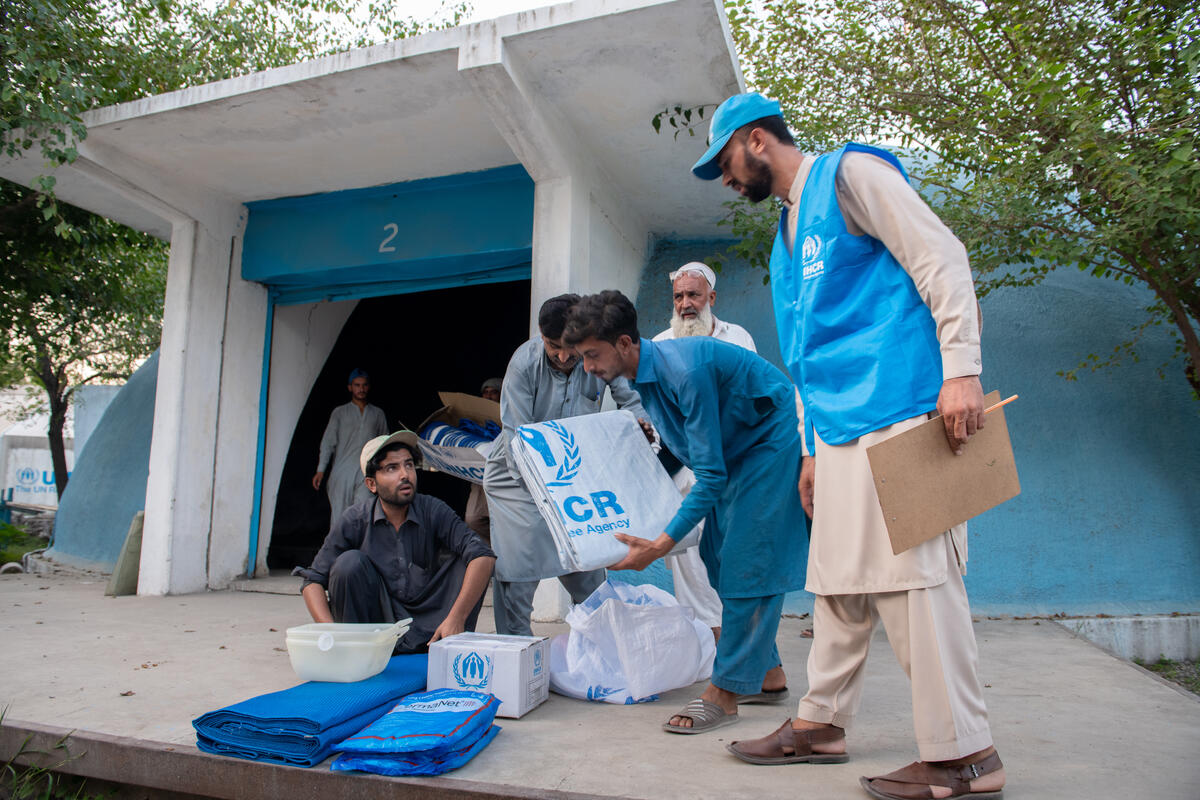UNHCR in major new humanitarian aid push into northern Iraq
UNHCR in major new humanitarian aid push into northern Iraq
In response to the deteriorating situation in northern Iraq, UNHCR is this week launching one of its largest aid pushes aimed at helping close to a half million people who have been forced to flee their homes.
Barring last-moment delays, an air, road and sea operation will begin tomorrow, starting with a four day airlift using Boeing 747s from Aqaba in Jordan to Erbil, followed by road convoys from Turkey and Jordan, and sea and land shipments from Dubai via Iran over the next 10 days.
The major focus is on improving living conditions for the displaced in the region, particularly people without shelter or housing. Conditions remain desperate for those without access to suitable shelter, people struggling to find food and water to feed their families, and those without access to primary medical care. Many are still coming to grips with the tragedy they've been through in recent weeks - fleeing homes with nothing, and many trying to cope with the loss of loved ones. Emergency support is an urgent need that we are trying to meet.
Included in the initial aid shipments are 3,300 tents, 20,000 plastic sheets, 18,500 kitchen sets, and 16,500 jerry cans. Support for this and further aid deliveries is coming from the Kingdom of Saudi Arabia, the US, the UK, Japan, Denmark, Kuwait, Luxembourg, Norway, Sweden and IKEA - a UNHCR corporate partner.
Meanwhile, inside Iraq, we are already working closely with regional authorities in Iraq's Kurdistan Region where at least half the displaced have settled, some 200,000 of them since early August when the city of Sinjar and neighbouring areas were seized by armed groups. The number of displaced people flowing into Duhok across the Peshkabour border has slowed in the past week from thousands per day to a few hundred. All still require our support.
Iraq's current humanitarian challenges are immense. While most of the displaced are still living rough in schools, mosques, churches, unfinished buildings and elsewhere, we have been pitching hundreds of family tents every day.
There are currently 9-12 sites in Dohuk and Erbil governorates which are at different stages of readiness - some are already housing displaced people and some will open in the coming days. These are likely to be boosted by additional camps to be set up by the International Humanitarian Partnership - with contributions from the emergency response agencies of the Swedish, German, Danish, Norway, British and Estonian governments. At this stage we envisage there being 12-14 sites in all with capacity for 140,000 people. UNHCR technical staff are currently assessing additional possible camp sites identified by the Kurdistan Regional Government to determine their suitability and to prioritize locations.
The needs are not confined to the Kurdistan Region. There are other camps or sites in other governorates where displaced people have gathered including in Sulaymaniyah, Diyala, and Kirkuk. The Iraqi government has also set up three caravan centres for the displaced in Baghdad.
UNHCR has now provided shelter and relief items to more than 210,000 people. UNHCR has also provided over 80,000 displaced people with protection monitoring and needs assessments, and nearly 3,500 individuals have been approved for cash assistance, with some already receiving it. Legal assistance will be provided to vulnerable families to ensure they can access their rights as Iraqi citizens, with referrals being made for those with specific assistance needs. Many also fled without documents, and we are helping them obtain new ones.
Northeast Syria
Inside Syria, UNHCR continues to help those Yazidi people fleeing the Sinjar area seeking shelter there. As of today there are an estimated 8,000 people at the Newroz camp, about 60 kilometres from the Iraqi border, plus an estimated 3,000 who have moved to Yazidi villages in and around the towns of Malkia, Qahtania, Amuda, Derbassia.
Others who were staying at the Newroz camp last week have returned to Iraq to reunite with their families. UNHCR is continuing to help with providing transport for the refugees to and from the camp and is flying in more aid from its warehouses in Damascus. The first of six flights arrived in Qamishli last night from Damascus, and the mattresses and electric fans are being delivered to the refugees today, to help improve conditions in the sweltering 45 degrees heat.
An estimated 1.2 million Iraqis have been displaced so far in 2014, including more than 500,000 from fighting in the Anbar region which began in January, and more than 600,000 displaced from conflicts in and around Mosul (since June) and more recently Sinjar (since early August).
For more information on this topic, please contact:
- In Erbil, Ned Colt on mobile +964 780 917 4173
- and Natalia Prokopchuk on mobile +964 780 921 7341
- In Geneva, Adrian Edwards on mobile +41 79 557 9120
- and Ariane Rummery on mobile +41 79 200 7617








